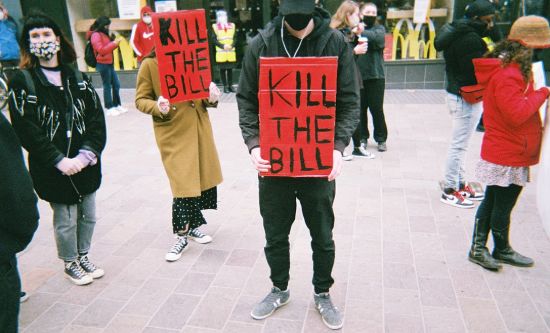
The Police, Crime, Sentencing and Courts Bill is continuing its passage through Parliament, and on 14 September was debated in the House of Lords. It will now be considered for a second time by a parliamentary committee; after this it will be sent back to the House of Commons, where it will become law. NICKI JAMESON reports.
The day before the Lords’ debate, the government published Equality Impact Assessments (EIA) for major sections of the Bill. This is in line with its obligations under the 2010 Equality Act to ‘have due regard’ to the need to ‘eliminate discrimination, harassment and victimisation’ and to advance equality of opportunity and foster good relations between ‘persons who share a relevant protected characteristic and persons who do not share it’.
This all sounds very nice, but in practice ‘having due regard’ pretty much means describing any discrimination which might arise but doing nothing to prevent it. The EIA process has highlighted several sections in the Bill which are discriminatory against racialised groups, but the assessors have also decided that this is ‘objectively justified’. This gives the green light to racial profiling.
‘Objectively’ targeting black youth
The Bill introduces a new criminal behaviour order called a Serious Violence Reduction Order (SVRO). The latest in a long line of such Orders which are imposed in addition to a criminal sentence and last for a number of years, this one is specifically for people convicted of possession of an offensive weapon, who can then be targeted for repeat stop-and-search without the need for any other justification.
Black people are disproportionately convicted and cautioned (136 per 100,000, as opposed to 23 for white and 26 for Asian people). Add this to the existing rates of stop-and-search, which the EIA itself agrees were such that in the year ending March 2020 ‘black people were 8.9 times as likely to be stopped as those who were white’, and factor in age and gender, and it becomes very clear that SVROs will disproportionately be imposed on young, black males.
This is then justified on the basis that young black males are also ‘more likely to be victims of serious violence’ and consequently ‘greater benefits could fall to those with the same characteristics’. The EIA therefore concludes that ‘this policy would have positive, not adverse, effects and be objectively justified’.
‘Objectively’ labelling Asians as terrorists
The Bill also contains measures to ‘strengthen the management of terrorist offenders and other offenders who may pose a terrorist risk’. This consists of new police powers to search premises, search individuals and make urgent arrests.
It is clear that those who will be targeted for pre-emptive arrests and searches are Asian and/or Muslim. The EIA justifies this by stating that ‘as at 31 December 2020, out of 209 offenders in custody in Great Britain for terrorism-connected offences, 98 self-identified as Asian/British Asian and 154 self-declared their religion as Muslim. This trend is consistent with Islamist terrorism posing the single most prevalent threat in the UK.’
The existence of a high proportion of those already convicted of terrorism being Asian/Muslim becomes justification for targeting the community as a whole, and ‘certain groups…are relatively more likely to have the new police powers applied to them following their introduction’. However, this is ‘objectively justified as a proportionate means of achieving the Government’s legitimate aim of protecting all members of the public from the threat of terrorism.’
Conveniently ignored is the increasing threat of far-right terrorism, whose perpetrators and adherents are of course overwhelmingly white.
‘Objectively’ discriminating against the Gypsy, Roma and Traveller community
Perhaps most blatant of all is the overt discrimination contained within the sections of the Bill headed ‘Unauthorised Encampments’. Despite the claim that ‘there is no direct discrimination within the meaning of the Equality Act as the law will apply to anyone’ and that ‘Any discriminatory impact for those of a particular race or ethnicity will be indirect’, this is clearly a wholesale attack on the Gypsy, Roma and Traveller (GRT) community, which even a massive slice of government double-speak cannot gloss over.
Again, the Home Office claims that ‘any indirect discrimination… can be objectively justified’, going on to say: ‘We recognise the rights of GRT communities to follow a nomadic way of life in line with their cultural heritage. Although this policy may have an effect on these groups…. Enforcement action will not be taken on the grounds of race or ethnicity, and instead will be based on whether any individual chooses to reside on land without permission and causes significant damage, disruption or distress, affecting the rights of others.’
And, as with the SVRO, the EIA section on this measure concludes by spinning the introduction of a blatantly racist measure as a positive contribution to society. In this case, it maintains that evicting GRT people from their homes will be positive for community relations, as ‘strengthening the ability of police to take enforcement action reduces the risk of vigilantism and hate crimes [and] will help to aid community cohesion through discouraging harmful behaviours’.
GRT representatives do not share this view and have described the Police Bill as the latest stage in the state’s attempted ‘cultural genocide’ of their community.
Under attack, we fight back!
The Police Bill is just one of a number of punitive laws being brought in by this vicious government. None of them will be defeated within Parliament and the wide-ranging attacks contained within them can only be defeated by the building of a mass independent solidarity movement uniting all those under attack.
Fight Racism! Fight Imperialism! No 284, October/November 2021




